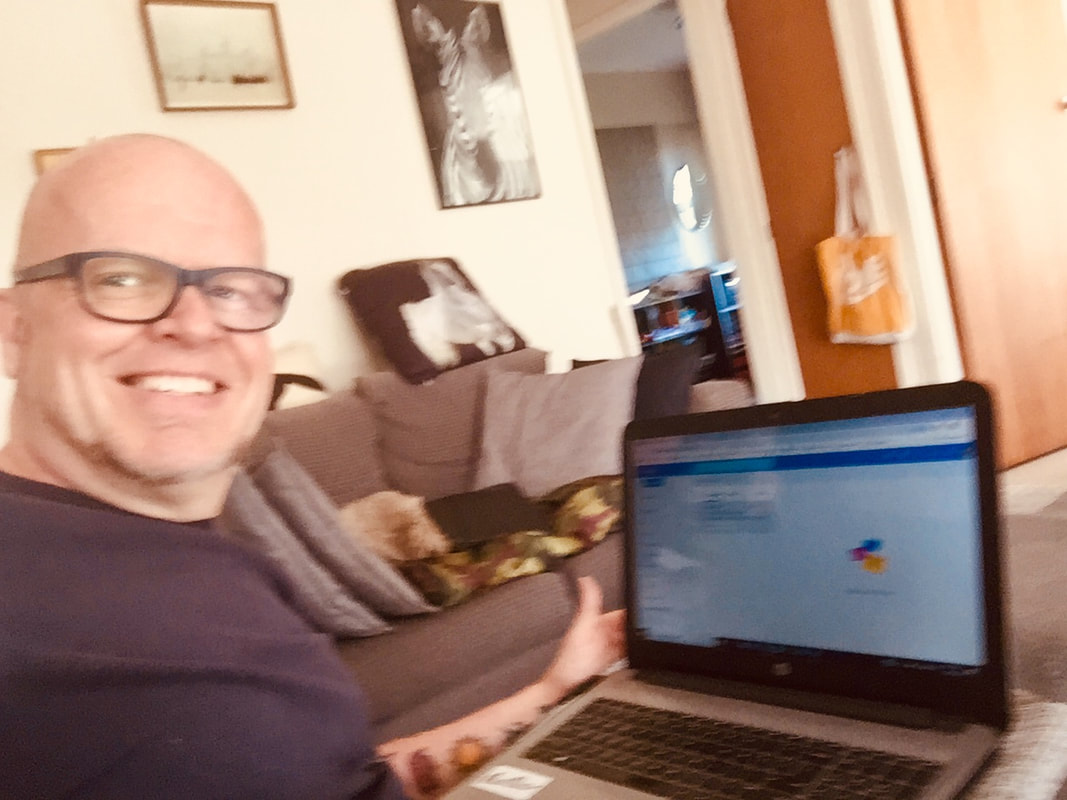Maintaining connection when the system is down – A lockdown low-down from our library
|
As I type my thoughts remotely from my sedate living room on the eve of our nation coming out of a 5 week lockdown, I am in a reflective mood.
Looking back on this enforced isolation period, I contemplate the various meanings of connection and explore their meaning to myself, my team and the diverse communities of people that we as a team of librarians reach out to understand their needs and serve. Libraries act as a hub for our varied communities. A common place, inviting individuals to come together to seek information; seek refuge; upskill; upload and offload; researching; relaxing; and reinvesting in themselves for the betterment of self and the wider society. And then things changed suddenly, for us all. |
To say that COVID-19 shook up our nation would be an understatement. The lasting effects and impacts of this global pandemic on our daily lives will be felt for many years to come. The ways in which we meet up, socialise, interact and connect must be done differently.
In late March, my library in the Glen Eden community, in the blink of an afternoon, was forced to close its doors quite abruptly as this offline virus infected my community and yours.
Suddenly, my team was no longer sharing our staff room, or offering support to each other at our bustling front desk area, they were forced home. And they had to stay there, not just for the weekend, but for some time to come.
I now had so many questions and things to consider. How would we be able to serve our customers? How would my team stay connected and communicate with each other? What work could we do and how would we do it?
Our normal way of doing things was suddenly undone. Somehow we had to try and continue operating Glen Eden Library as a functioning unit and as an engaged team.
In late March, my library in the Glen Eden community, in the blink of an afternoon, was forced to close its doors quite abruptly as this offline virus infected my community and yours.
Suddenly, my team was no longer sharing our staff room, or offering support to each other at our bustling front desk area, they were forced home. And they had to stay there, not just for the weekend, but for some time to come.
I now had so many questions and things to consider. How would we be able to serve our customers? How would my team stay connected and communicate with each other? What work could we do and how would we do it?
Our normal way of doing things was suddenly undone. Somehow we had to try and continue operating Glen Eden Library as a functioning unit and as an engaged team.
So what did we do?
As a team leader, keeping my work whanau informed and supported is a key part of my role. This aspect of maintaining unity and connection became even more of a priority for me, now that we were isolated by location and challenged by our vocation.
In the initial period of lockdown, phone calls provided reassurance for staff and a warm and direct means of checking in and relaying any important information. To regularly hear each other enabled an effective well-being gauge for me, allowing both laughter and concerns to be shared.
Work emails could be checked on personal laptops and devices. My role was to receive, decipher and distribute key information in a succinct and timely manner. Initially, in the early stages of the lockdown, the situation was quite fluid. It was some time before regular information flows were established, with technical limitations such as overloaded bandwidth and duplication of bulletins proving difficult at first. This was remedied via set announcement times and restricting non-essential work from taking place until after designated times, thus freeing up council servers.
As many of the team were regular users of social media platforms, Facebook provided a less formal means of talking to each other online via messenger. Staff members were able to ask questions in real time, offer up team support for each other and maintain that looser level of chat (including jokes, GIFs, recipes, internet tips and Netflix suggestions). What unravelled was a lovely organic platform, for both uplifting each other and encouraging team motivation, vital in maintaining our connection with each other.
BAU or business as usual, took on a very unusual structure, with team members having to undertake self-learning and upskilling themselves remotely. This home learning expectation required a shared platform for feeding back work and we found Microsoft Teams software provided an easy-to-navigate format for all to use. Channels were established for learnings such as digital discoveries, te reo language confidence building, and a re-opening task force planning forum overseeing various scenarios for Levels 3 and beyond.
In the initial period of lockdown, phone calls provided reassurance for staff and a warm and direct means of checking in and relaying any important information. To regularly hear each other enabled an effective well-being gauge for me, allowing both laughter and concerns to be shared.
Work emails could be checked on personal laptops and devices. My role was to receive, decipher and distribute key information in a succinct and timely manner. Initially, in the early stages of the lockdown, the situation was quite fluid. It was some time before regular information flows were established, with technical limitations such as overloaded bandwidth and duplication of bulletins proving difficult at first. This was remedied via set announcement times and restricting non-essential work from taking place until after designated times, thus freeing up council servers.
As many of the team were regular users of social media platforms, Facebook provided a less formal means of talking to each other online via messenger. Staff members were able to ask questions in real time, offer up team support for each other and maintain that looser level of chat (including jokes, GIFs, recipes, internet tips and Netflix suggestions). What unravelled was a lovely organic platform, for both uplifting each other and encouraging team motivation, vital in maintaining our connection with each other.
BAU or business as usual, took on a very unusual structure, with team members having to undertake self-learning and upskilling themselves remotely. This home learning expectation required a shared platform for feeding back work and we found Microsoft Teams software provided an easy-to-navigate format for all to use. Channels were established for learnings such as digital discoveries, te reo language confidence building, and a re-opening task force planning forum overseeing various scenarios for Levels 3 and beyond.
Reflections and Rewards
Like much of our library workforce, any age-friendly organisation experiences varying skill levels and digital competence is an area that often presents many challenges as technology and user needs are ever changing.
The lockdown has forced our team to pretty much do everything online resulting in many computer generated celebrations of success. Be it a smartphone, laptop or notebook, staff members have mastered the connectivity conundrums of SKYPE meetings and are now confident and familiar with sharing online storytimes and sessions via Zoom – something that would have proven too hard to do previously.
This abrupt adoption of digital platforms has jump-started a shared understanding and increased confidence of all things technical, embracing a problem-solving culture, which was not previously evident in the team. It has been great to see this evolve.
A significant opportunity arose for some of my team to be part of a wider council initiative, in conjunction with the Auckland Emergency Management’s COVID-19 response, to support the Ministry of Health in contacting elderly people in our community. This redeployment enabled staff to make phone calls from their homes, checking in on and supporting our over 70s. All the team members involved spoke of the benefits of feeling worthwhile and able to assist in non-library related assistance to our communities.
Uncertainty remains a strong factor in the future of our workforce. The restrictions made necessary by COVID-19 demonstrate that we can’t solely rely on traditional ways of staying in touch with our teams and communities.
If there is one thing that we have learned so far, it’s that libraries lead their sector in agility and resilience. The Where, How and What we deliver has changed and will continue to do so. However, with a connected team of individuals that belong to a whanau of helpers, solvers and doers, we as a nation will be supported and served by library super heroes for many years to come.
The lockdown has forced our team to pretty much do everything online resulting in many computer generated celebrations of success. Be it a smartphone, laptop or notebook, staff members have mastered the connectivity conundrums of SKYPE meetings and are now confident and familiar with sharing online storytimes and sessions via Zoom – something that would have proven too hard to do previously.
This abrupt adoption of digital platforms has jump-started a shared understanding and increased confidence of all things technical, embracing a problem-solving culture, which was not previously evident in the team. It has been great to see this evolve.
A significant opportunity arose for some of my team to be part of a wider council initiative, in conjunction with the Auckland Emergency Management’s COVID-19 response, to support the Ministry of Health in contacting elderly people in our community. This redeployment enabled staff to make phone calls from their homes, checking in on and supporting our over 70s. All the team members involved spoke of the benefits of feeling worthwhile and able to assist in non-library related assistance to our communities.
Uncertainty remains a strong factor in the future of our workforce. The restrictions made necessary by COVID-19 demonstrate that we can’t solely rely on traditional ways of staying in touch with our teams and communities.
If there is one thing that we have learned so far, it’s that libraries lead their sector in agility and resilience. The Where, How and What we deliver has changed and will continue to do so. However, with a connected team of individuals that belong to a whanau of helpers, solvers and doers, we as a nation will be supported and served by library super heroes for many years to come.
|
Dave Tucker is Manager of Glen Eden Community Library. He describes himself as a community library people leader with a passion for change. Dave says: The 12 years that I have fully immersed myself in all things library, has allowed me to connect, collaborate and create some amazing services and programs with some incredible people. I love people and helping find solutions through service. Being an inspiring coach and mentor for my team, is my goal and the guiding beacon for betterment of myself and the continual evolvement of what libraries have to offer their communities. |


